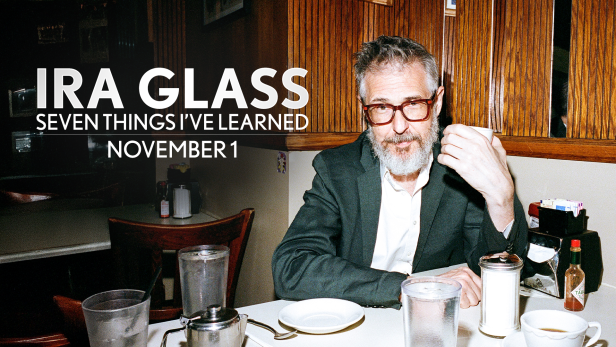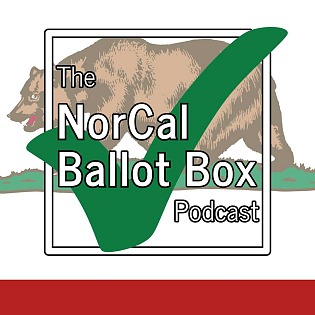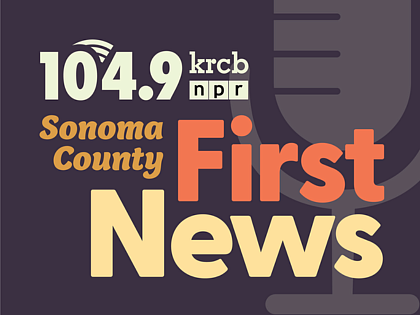 photo credit: Courtesy of Luther Burbank Center for the Arts
photo credit: Courtesy of Luther Burbank Center for the ArtsIra Glass.
Ira Glass is the host of “This American Life,” the popular, longtime weekly storytelling program airing on public radio.
Glass is coming to Santa Rosa. Saturday night, Glass will be speaking at Luther Burbank Center for the Arts; His tour is called “Seven Things I’ve Learned.”
KRCB News sat down with him to chat about the future of storytelling.
IRA GLASS: My name is Ira Glass and I'm the host of this American Life.
SHANDRA BACK: This American Life, it's been on air for almost three decades. You've been in this career as a storyteller even longer than that. Are there any universal throughlines that you found in the power of storytelling that you've picked up on throughout it all?
GLASS: One of the things I talk about in the show are things we look for in making stories for the radio and things that make things especially powerful, dumb basic things. Like a story has to be surprising. There has to be somebody who can connect to, we like it if they're funny. And then everything else sort of depends on the on the story.
BACK: I'm wondering on the flip side of that, staying relevant is something that is on so many minds right now. Was there a moment in your career so far where you realized, oh wow, we gotta change some things up, or, even in hindsight, you realized that you were behind the curve?
GLASS: Right now it might be that moment. It is just an odd time to be a journalist when so much of the country is not interested in the facts of things and you know, even on our show, which is like often very personal stories, sometimes we'll do things in the news. And it's a fact checked show where everything is true and I feel very awake to the reality that there are lots of people who just are not that interested in what the facts of things are. We're such a polarized country.
BACK: And so what has your approach been then at this particular moment in time. Where is your mind at?
GLASS: I think the thing that you can do on the radio, and that radio is especially powerful for, is just to get in and tell some personal story. Radio is such an intimate medium. There's just something about hearing somebody's voice on the air and if they're talking from the heart, it just can get to you. I feel like in contrast to the, the daily news shows, which are excellent, but not what we do, I feel like what we can do is just introduce you to people who are in a situation and you wanna find out what's gonna happen to them. And, I think that there's something to that that people can still connect to. Even if their politics are such that they might not want to, look at certain facts about what's happening.
BACK: And on the line of staying relevant. And I know it started out as a radio show and it still is, and it moved into the podcast space, is there anything that you're thinking into the future, in keeping people engaged and in keeping people connected with, like you said, the emotion and the story of what this American life represents?
GLASS: It's funny, literally like the phone call that I was on before we started this interview was with a guy who we're talking about maybe putting up some of our episodes or maybe all of our episodes like with video and what it would cost to do video that would be interesting enough to see. 'Cause now, like right now, so many podcasts have video feeds on YouTube and, and so we're talking about doing a thing, not where you would necessarily see the people. We were animate images and just do something that would be very different from what other people were doing. And kind of beautiful to look at.
BACK: What's one piece of advice you'd give to new storytellers entering into this creative space in this particular moment in time?
GLASS: I would give three pieces of advice. One is don't wait. I think that often people who want to do something ambitious feel like, "Oh, I'll get to that at some point."
I just feel like, just do it now. The second thing is for people working in radio I feel like the single fastest way that any radio reporter can make their stories more sparkly is if they are in the tape more.
And what I mean is like in the quotes, I feel like there's a kind of default in public radio where when you hear a quote in a story, it's just the interviewee. The more that you are a character in the tape with the other person creating a drama, creating a moment that's the fastest way to make kind of like a quick daily story just more sparkly. And then the big thing, I think for anybody making anything, the most important thing is to always be out to amuse yourself.
BACK: To amuse yourself?
GLASS: Yeah. I started in public radio in the 1970s. That's how old I am. And NPR had only existed for a few years, but that was very much the ethos of the early 'All Things Considered.' And we were out to cover the news and we were out to provide a service that nobody else provided and get voices on the air that nobody else had on the air, but really we were also very much about we were out for our own fun. The more that the people who are in it are out for their own pleasure, the more the audience will get that from the story.
And I say that and it seems utterly obvious, but I think given the high-minded ideals of public broadcasting, often that doesn't get said. And that's a big part of how we make our show. It's a big part of this thing I'll be doing there on Saturday night. Even when there are serious topics, we'll do very serious stories in Gaza and in other places, but there'll be funny moments in them. There just will be, because even in the midst of something very serious, like anybody knows who's lived through something hard and difficult, they're just weird, funny things that happen and , you wanna get to that level of complexity of the world.
You want the world to be its full, proper size.
BACK: Thank you for your time. I really appreciate it.
GLASS: Thanks for talking to me.

 Live Radio
Live Radio




